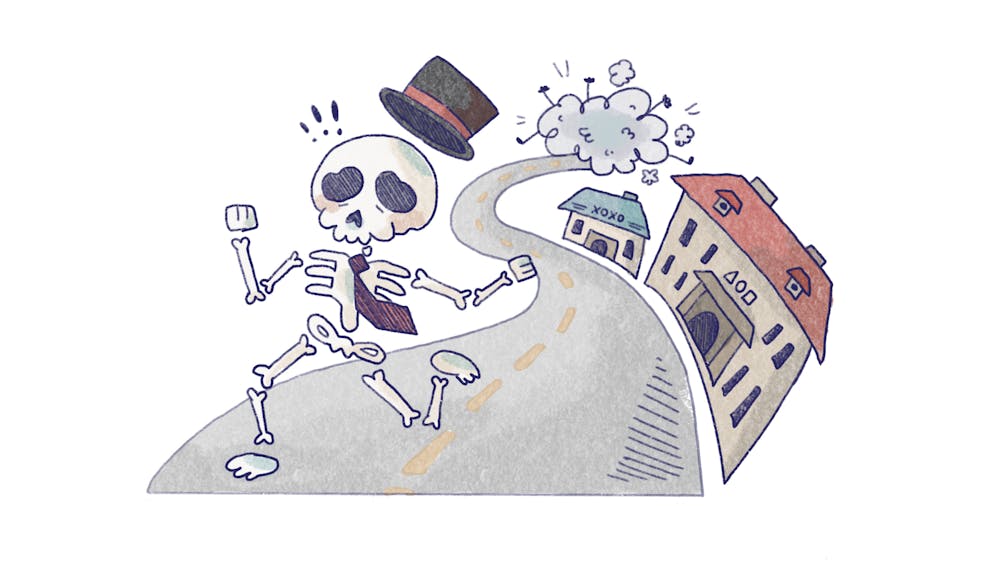In college, no one questioned my desire to learn guitar from YouTube videos. But as soon as my passion for math arose, I was met with confounded faces asking why I would partake in such a strange hobby. Chatting about your favorite artists, for whatever reason, is much more socially acceptable than rambling about applications of differential equations. But why? What’s so different about learning guitar for my own enjoyment and learning math?
I believe the difference is much less significant than many of us assume and is largely due to the way we evaluate students: grades. Emory College’s grading policy is brief and traditional without a mention of the philosophy behind it. However, the University can implement some changes that can benefit student experience without completely overhauling our current policy. For example, Emory can make core courses for first-year students count on a pass/no-record basis, which differs from the present satisfactory/unsatisfactory system in that a failing grade is not recorded on the student’s transcript. Emory can also place an emphasis on feedback by allowing students to request course reports, evaluations written by the professor that are designed to help a student measure the efficacy of their study methods and their content mastery.
If I received a grade for playing my guitar, surely I would have quit long ago. The pressure of having to perform well would undoubtedly detract from the enjoyment I derive from playing, and I’d become much more reluctant to take risks.
Risks, growth, passion — grades have been proven to be the enemy of all these things, and the reason is not very surprising. Instead of encouraging students to learn, letter grades ultimately result in motivating students to avoid bad grades, whether learning is part of the process or not. This creates anxiety, competition and promotes external incentives such as memorizing concepts rather than understanding them. The latter have been shown to obstruct the development of optimal thinking and most importantly, an interest in learning. The goal of any education is not to cram information into students’ skulls, but to help them develop the tools for learning. Internal motivation is a tool and catalyst. Without an internal drive, any intellectual growth becomes extremely difficult.
“Education is not the filling of a pail, but the lighting of a fire,” W.B. Yeats famously said.
If students are to learn, they must be engaged and motivated. The comments students receive from professors should impel such motivation. Grades are classified as a form of evaluative feedback, that is, feedback that judges a student’s performance. But research has suggested that students need less evaluative feedback and more descriptive feedback that specifically comments on how they can improve. Researchers also observed that relying heavily on forms of evaluative feedback instigates a fear of failure and hinders future development of problem-solving skills. Grades are such a poor medium of critique that even when students received both a grade and positive comments on an assignment, they overlooked the instructor’s thoughts entirely and focused on the percentage on the page.
But it gets worse. Think of curved grading, which is based on the assumption that aptitude should be normally distributed in the classroom. It only exaggerates minimal differences in performance and nurtures toxic competition. This cutthroat environment has been shown to reduce the retention of information and student motivation while also promoting the idea that there are only a handful of students capable of performing well. But if an instructor were to appropriately support their students’ various learning methods, regardless of the distribution of aptitude, shouldn’t it be reasonable to believe that each student is capable of achieving mastery of the material? Cooperation is crucial in any workspace and such unjustified competition stimulated by curving grades is unacceptable. A university education should inspire students to learn for the sake of learning, not discourage it.
Faced with the prospect of liability for a toxic culture, some instructors are experimenting with different grading methods. Associate Professor of Chemistry William Wuest taught my freshman seminar, “Chemistry of Microbes: A to Z,” during which he implemented an “ungrading” approach, wherein students received a letter grade at the end of the term but never received grades on any assignments. Instead, Wuest encouraged peer reviews and provided direct, substantive feedback. Given the lack of formal grades, I never completed assignments just for the sake of completing them; instead, I found myself intrinsically motivated to learn and internalize the material. Releasing the pressure of grades makes it a lot easier to focus on learning. While entrusting so many students to maintain their work ethic without the pressure of grades may seem foolish, Wuest was eminently pleased by the overall student satisfaction, performance and attendance. From all 18 students, there was only one absence the entire semester.
Despite the overwhelming evidence, little has been done to alleviate grades’ wide-ranging damage to academia. More recently, grades have served as a logistical tool to facilitate communication between institutions while heavily disregarding student development. This has resulted in stressful competition and turned learning into a chore. Additionally, grade inflation has made an excellent transcript less impressive, detracting from the logistical role grades play and leaving recruiters to consider other evaluative methods.
I propose that Emory adopt a policy that Brown University (R.I.) has had in place for over 50 years: course performance reports. Students should have the option of requesting written evaluations of their performance directly from the professor, regardless of the grade they received in the course. These are not miniature letters of recommendation, but objective honest feedback tailored toward each student. Moreover, given the major disadvantages of curved grading, even when compared to traditional grading, Emory should prohibit this practice in its entirety. To alleviate the transition to college, freshman courses should also be taken on a pass/no-record basis, as is done at Massachusetts Institute of Technology. Institutional reform is slow, and these changes would likely take many years to implement, but professors can mostly change their grading policy as they wish. Therefore, all I have to say to educators is this: to genuinely help students, stop grading traditionally.
Sergio Eraso (23C) is from Miami.









